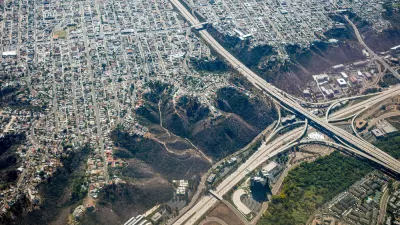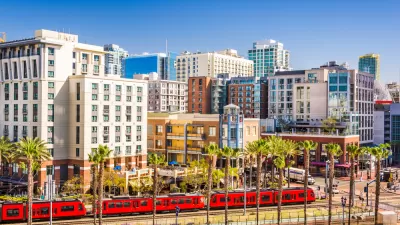The March ballot in San Diego County will ask voters to make big decisions about planning and development on the fringes of the developed parts of the county.

Scott Lewis and Andrew Keatts report on the politics behind two controversial ballot initiatives that will shape how rural and sprawling developments get approved in San Diego County.
The occasion for the article is a recent decision by the San Diego County Democratic Party to oppose Measure A, an "initiative that would force most housing projects that require special changes to the general plan of the county to get support from voters countywide."
Measure A is portrayed as an anti-sprawl measure, but Will Rodriguez-Kennedy, the party chair, issued a statement that didn't oppose this kind of ballot box planning as a procedural misstep, arguing instead that Measure A would make it harder to build needed housing in San Diego County. "And with that, we saw the head of the Democratic Party seemingly endorse what many of his Democratic counterparts call sprawl," according to the article.
The second ballot initiative, Measure B, would overturn the approval of the 2,135-home Newland Sierra project, to be built north of Escondido. According to the article, the Democratic Party decided to oppose that project, potentially contradicting the party's position on Measure A, according to the article.
FULL STORY: Politics Report: Dems Twisted Up on Rural Development

Maui's Vacation Rental Debate Turns Ugly
Verbal attacks, misinformation campaigns and fistfights plague a high-stakes debate to convert thousands of vacation rentals into long-term housing.

Planetizen Federal Action Tracker
A weekly monitor of how Trump’s orders and actions are impacting planners and planning in America.

In Urban Planning, AI Prompting Could be the New Design Thinking
Creativity has long been key to great urban design. What if we see AI as our new creative partner?

How Trump's HUD Budget Proposal Would Harm Homelessness Response
Experts say the change to the HUD budget would make it more difficult to identify people who are homeless and connect them with services, and to prevent homelessness.

The Vast Potential of the Right-of-Way
One writer argues that the space between two building faces is the most important element of the built environment.

Florida Seniors Face Rising Homelessness Risk
High housing costs are pushing more seniors, many of them on a fixed income, into homelessness.
Urban Design for Planners 1: Software Tools
This six-course series explores essential urban design concepts using open source software and equips planners with the tools they need to participate fully in the urban design process.
Planning for Universal Design
Learn the tools for implementing Universal Design in planning regulations.
Gallatin County Department of Planning & Community Development
Heyer Gruel & Associates PA
JM Goldson LLC
City of Camden Redevelopment Agency
City of Astoria
Transportation Research & Education Center (TREC) at Portland State University
Jefferson Parish Government
Camden Redevelopment Agency
City of Claremont





























